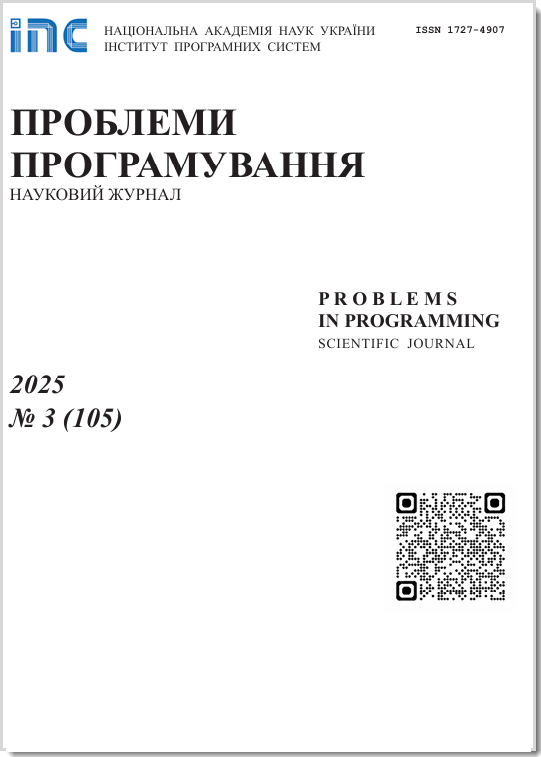On the classes of causal networks, identifiable by simple independence tests
Abstract
We tackle some theoretical problems of constraint-based approach to causal network inference from data (without prior restrictions). Our interest is to recover a model structure from independence tests of zero and first rank only. Class of 1-identifiable causal structures is defined. An idea to recognize whether model recovery is successfully completed (i.e. adequate model structure is outputted) is suggested. The
framework of locally minimal separation in DAG is shown to be appropriate instrument to tackle the problem. A few subclasses of class of 1-identifiable structures are specified; corresponding structural restrictions and criteria of recovery completeness are given. We present some causal structures which are not 1-identifiable.
Problems in programming 2018; 2-3: 180-188
Keywords
Full Text:
PDF (Українська)References
Pearl J. Causality: models, reasoning, and inference. Cambridge: Cambridge Univ. Press, 2000. 526 p.
Spirtes P. Introduction to causal inference. J. of Machine Learning Research. 2010. Vol. 11. P. 1643−1662.
Balabanov O. S. (2017). Knowledge discovery in data and causal models in analytical informatics. Problems in Programming. (3), 96−112. [in Ukrainian]
Balabanov O.S. (2014). Causal nets: analysis, synthesis and inference from statistical data, Doctor of math. sciences thesis, V.M. Glushkov Institute of Cybernetics, Kyiv, Ukraine. [In Ukrainian]
Studeny M. (1993). Formal properties of conditional independence in different calculi of AI. In: Symbolic and Quantitative Approaches to Reasoning and Uncertainty (eds. M. Clarke, R. Kruse, S. Moral), Springer-Verlag, 341−348.
https://doi.org/10.1007/BFb0028219
Chow C.K., Liu C.K. (1968). Approximating discrete probability distributions with dependence trees. IEEE trans. on Inform. Theory. 14, (3), 462-467.
https://doi.org/10.1109/TIT.1968.1054142
Balabanov O.S. (2011). Accelerating algorithms for Bayesian networks recovery. Adaptation to structures without cycles. Problems in programming. (1), 63-69. [In Ukrainian]
Balabanov O.S. (2017). Principles and analytical tools for reconstruction of probabilistic dependency structures in special class. Problems in programming. (1), 97-110. [in Ukrainian]
Balabanov A.S. (2008). Minimal separators in dependency structures: Properties and identification. Cybernetics and Systems Analysis. 44, (6), 803-815.
https://doi.org/10.1007/s10559-008-9055-3
Balabanov A.S. (2009). Construction of minimal d-separators in a dependency system. Cybernetics and Systems Analysis. 45, (5), 703-713.
https://doi.org/10.1007/s10559-009-9136-y
Balabanov A.S. (2009). Reconstruction of the model of probabilistic dependences by statistical data. Tools and algorithm. Journal of Automation and Information Sciences. 41, (12), 32-46. (ISSN 1064-2315).
https://doi.org/10.1615/JAutomatInfScien.v41.i12.20
DOI: https://doi.org/10.15407/pp2018.02.180
Refbacks
- There are currently no refbacks.




